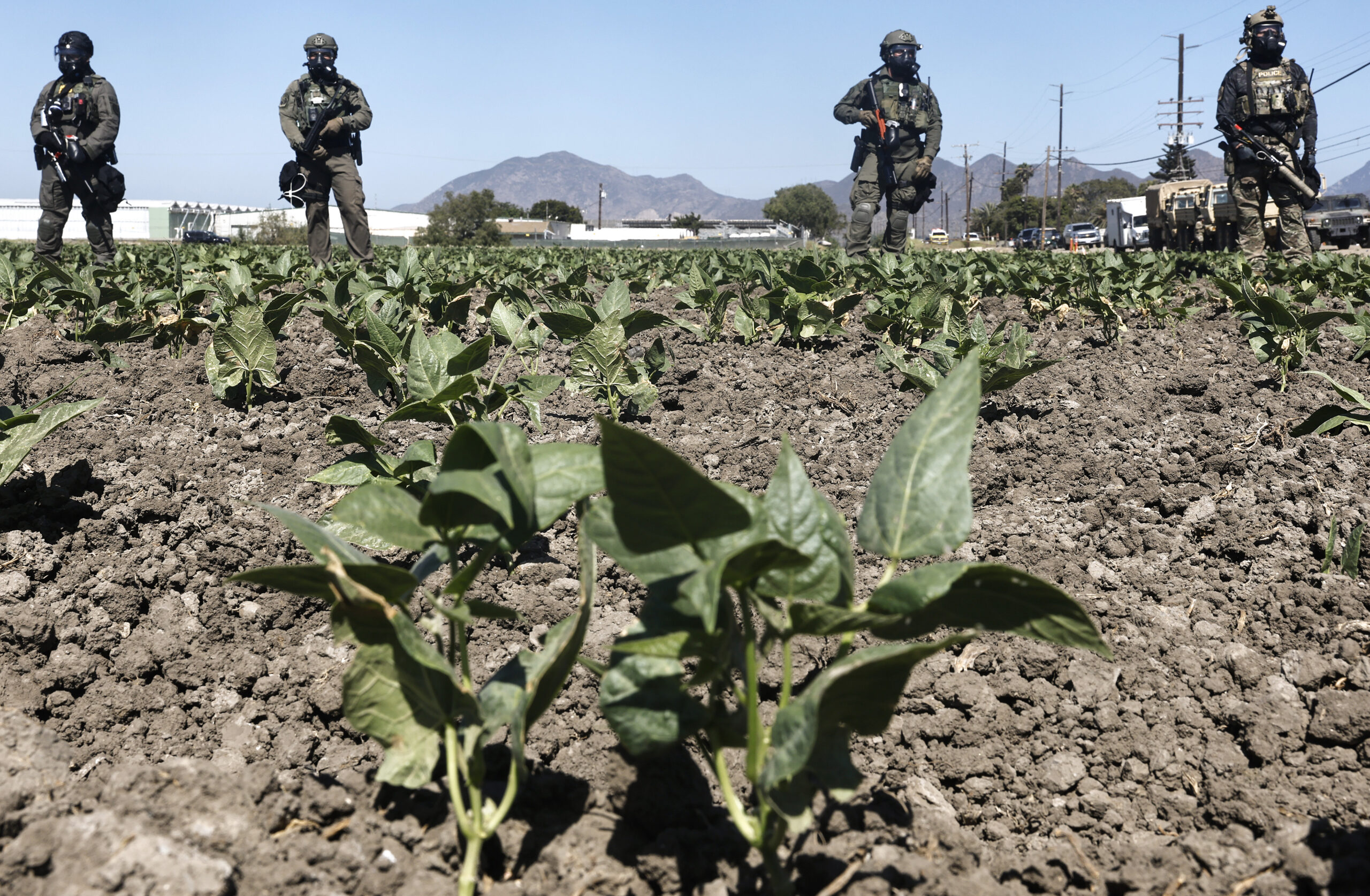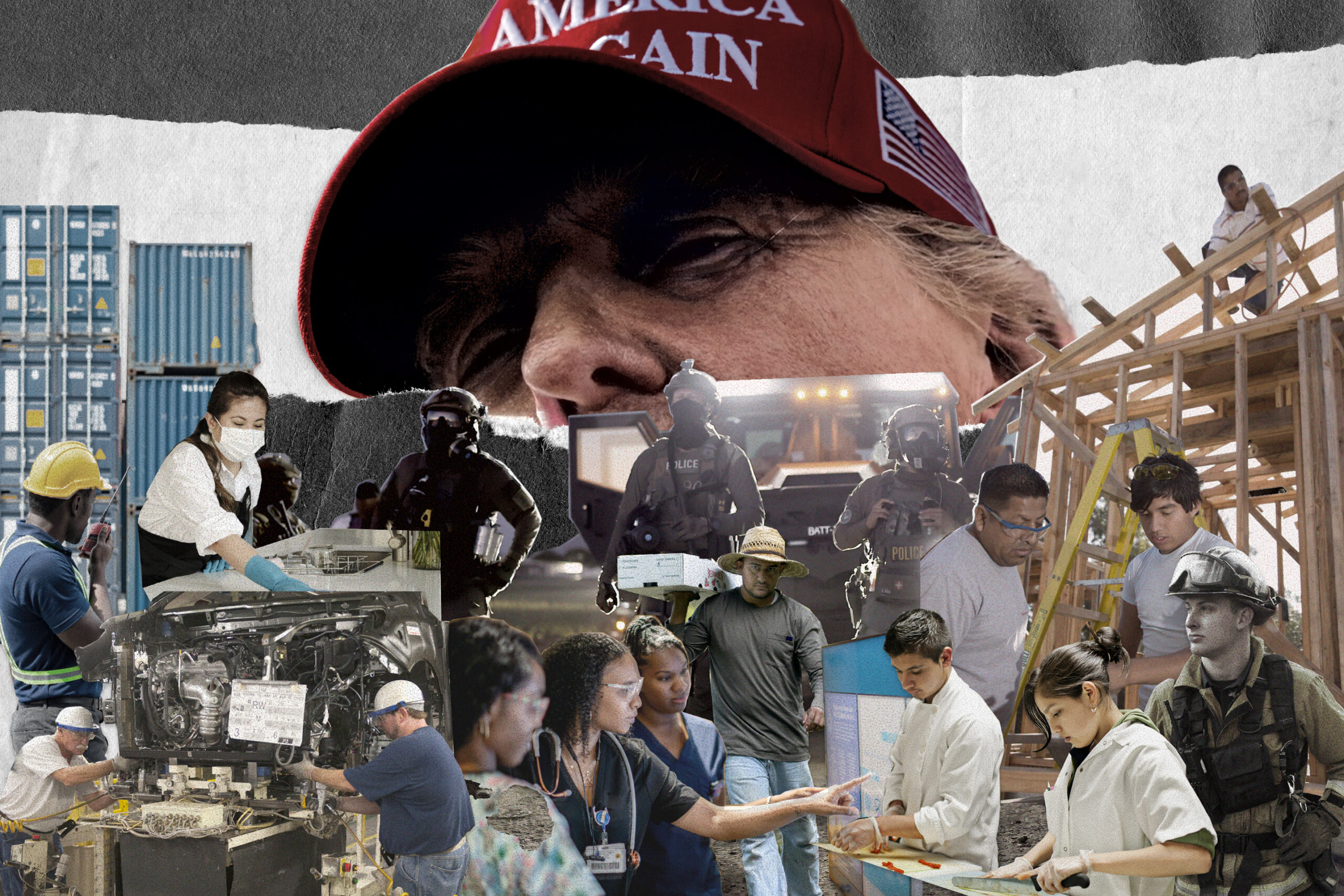A San Diego restaurant owner who serves many immigrant customers has seen business plummet. A cleaning woman avoids bringing tools to work to avoid drawing attention to herself. Her husband, a construction worker, has been unemployed for over a month. A California farm had to hire an attorney to protect workers with approved visas from deportation.
California — and other states across the country — rely heavily on the labor of immigrants. Many of those workers are living in fear of Immigration and Customs Enforcement raids, making it harder to do their jobs. Experts say this fear is restricting the rights of all workers and hurting the state’s broader economy.
Capital & Main spoke to workers and an employer in California about how President Donald Trump’s campaign against immigrants is affecting their ability to work. All of them requested anonymity out of fear of retaliation from the federal government.
The restaurant owner said traffic to his business dropped immediately after ICE officials targeted another restaurant, Buona Forchetta, in a highly visible operation that drew community protest and a violent response from ICE.
Since then, the owner said, his sales have dropped by 30%-40% because immigrant customers aren’t leaving their homes except for essential tasks like work.
The owner, who is a naturalized U.S. citizen, said one of his workers self-deported at the beginning of the Trump administration and another is out on maternity leave. He hasn’t replaced either of them.
The restaurant owner’s experiences line up with findings in a recent research brief from the University of California, Merced, Community and Labor Center, which found that fewer Californians, both citizens and noncitizens, went to work the week that intense immigration raids began in Los Angeles in June.
Private sector employment in the state declined just over 3% from the previous month, researchers found.
Edward Flores, faculty director of the UC Merced Community and Labor Center, said that shift is significant.
“The only time we see a decline in private sector employment like that at that time of year is really comparable to the Great Recession or to COVID,” Flores said.
That decline continued the following month, the researchers later said in an update.
Flores listed several possible reasons for the drop, including that workers were afraid to go to work, a supply chain slowdown from missing immigrant labor could be creating less available work or — as in the restaurant owner’s case — frightened customers might be shopping less.
Flores said the fact that U.S. citizens showed a significant drop in employment goes against the Trump administration’s claims that deporting noncitizens will free up jobs for people born in the U.S.
“Most people that understand economics pretty well will tell you that’s not how the economy works. It’s more complicated than that,” Flores said. “We’re seeing the actual consequences of people very aggressively being taken — without any due process in some cases — and, confronted with those realities, if the administration continues to advance their very aggressive efforts to have the largest deportation campaign in history, we have to wonder what is the actual intent of it.”
The intent is clear to many undocumented workers, including a woman who cleans buildings and houses.
“Things are getting more difficult for the simple fact of the color of our skin,” the woman said in Spanish. “We are the most looked for [by ICE].”
She said she’s been in the U.S. for more than two decades and has two U.S. citizen children with her husband, who is also undocumented. The pair met in San Diego soon after she arrived from Guerrero, Mexico, she said.
The woman said there aren’t enough workers in her industry. She said she’s afraid to go to work, but she has no choice because she has bills to pay. She added that construction work has slowed down since Trump came into office, leaving her partner without a way to make a living.
She works for a cleaning company full time and cleans homes as a side job. She works seven days a week.
She said she tries not to carry as many tools and supplies when she goes to work at the private homes so that she doesn’t attract attention to herself.
“I never felt so afraid since the time I got here as in this time period since Jan. 20, 2025,” she said.
She admitted that she often avoids going out for anything besides work, preferring to skip birthday celebrations and other events to stay safe at home.
Sometimes people don’t want to pay her after she finishes cleaning, she said, and they threaten that they will call immigration officials if she objects.
Those situations have always caused some fear, she said, but it’s even more so now.
She and her partner are seriously considering returning to Mexico after their youngest finishes high school, she said.
She is afraid to go back to Guerrero, where her family has experienced the violence that has caused many to flee the state and seek asylum elsewhere.
But, she said, in the current situation, she feels more afraid to be here.
“It’s not the American dream anymore, as they say,” she said.
Satomi Rash-Zeigler, executive director of the University of California, San Diego, Labor Center, said that Trump’s policies have a chilling effect not only on immigrant labor but also on workers’ ability to advocate for their rights, regardless of their immigration status or country of origin.
“By targeting the folks that are the most vulnerable, we are undermining all workers, basically creating a system where you have bad employers that will be able to thrive with little to no accountability,” Rash-Zeigler said.
She said employee fear of reporting hazards in the workplace can lead to public safety issues, such as farm workers not feeling safe to report an employer using a toxic pesticide on crops.
Rash-Zeigler said documented and undocumented workers alike are afraid of ICE raids because of the violent tactics that the agency has used.
“People don’t want to interact with that,” she said. “They try to keep their heads down and not be caught in the fray of these sweeps. It’s impacting everyone.”
She said even U.S. citizen workers could be afraid to report workplace abuse because it could attract the attention of immigration officials.
“Fear is a policy tool of fascism,” Rash-Zeigler said. “They want the boss to have all the power. They want to keep workers silent and compliant under any and all circumstances and that’s just — it’s not good for workers. It’s not good for our country.”
A woman from Sonora, Mexico, said she hasn’t been looking for work even though her family is struggling because she is afraid of ICE.
She said she knows firsthand about the struggles with workplace exploitation as an undocumented worker. She worked for more than a decade at a bakery in San Diego.
When it was her shift, she said, she was the only one on duty in the kitchen. Eventually, the work wore her down physically, causing debilitating arthritis in her hands and knees, she said. She asked for help from her employer so that she wouldn’t have to do the work alone. Instead, the bakery cut her hours, she said.
When they hired other workers to replace her, she said, the bakery staffed more people in the kitchen.
A doctor told her she could no longer do the work, but the bakery has refused to compensate her.
“The truth is I feel sad because what one wants is to work, and one puts in a lot of effort, and that’s not the way they should behave with one,” she said in Spanish.
Her oldest daughter, who was born in the U.S. and is still in high school, now works to help support the family. But the family struggles to make ends meet, often receiving support from friends and neighbors.
As immigration raids have grown increasingly common, the mother has stopped leaving the house, she said. Her daughter does the grocery shopping and other errands.
The mother feels proud of what she has been able to provide for her children during her time in the U.S., she said, but she also worries that her life is now at a low point.
She has thought about trying to find another job that she can do in her condition, but she said she hasn’t because of fear of the raids.
That fear has even reached agricultural workers here on visas. On a recent day at the immigration court in downtown San Diego, a group of men faced potential deportation even though they said they were here on current H2A visas — the visas given to temporary or seasonal agricultural workers.
The men had previously been in the U.S. working for the same employer, according to Kathrin Mautino, an attorney. The employer, a farm in Fallbrook, California, had tried to extend the men’s visas last year, but the men ended up leaving for the winter holidays to go home, many to Jalisco, Mexico, before the date on their original visas, according to the attorney and several of the men.
The men came back again in June and July.
They weren’t afraid when they entered the country, one of the men said, because they thought all of their paperwork was in order. But then documents indicating they had pending immigration court cases arrived at their workplace.
“We’re clean. We thought everything was fine,” the man said in Spanish standing in the hallway of the immigration court. “We didn’t expect this.”
Now they’re nervous, and losing time at work to show up for court hearings. Their employer paid for Mautino to represent them.
“Work is the same, but all of a sudden you’re thinking, ‘They’re going to send me to Mexico again,’” one of the men said.
One man said he had just entered the country the week prior, and a customs officer informed him that he had a pending deportation case.
“We’re coming legally and leaving legally,” one of the men said. “It’s a little bad what they’re doing. We have papers.”
Copyright 2025 Capital & Main


 Column - State of InequalityJanuary 29, 2026
Column - State of InequalityJanuary 29, 2026
 Latest NewsFebruary 3, 2026
Latest NewsFebruary 3, 2026
 Dirty MoneyJanuary 30, 2026
Dirty MoneyJanuary 30, 2026
 Featured VideoFebruary 4, 2026
Featured VideoFebruary 4, 2026
 The SlickFebruary 2, 2026
The SlickFebruary 2, 2026
 Column - State of InequalityFebruary 5, 2026
Column - State of InequalityFebruary 5, 2026
 Column - California UncoveredFebruary 6, 2026
Column - California UncoveredFebruary 6, 2026
 The SlickFebruary 10, 2026
The SlickFebruary 10, 2026

